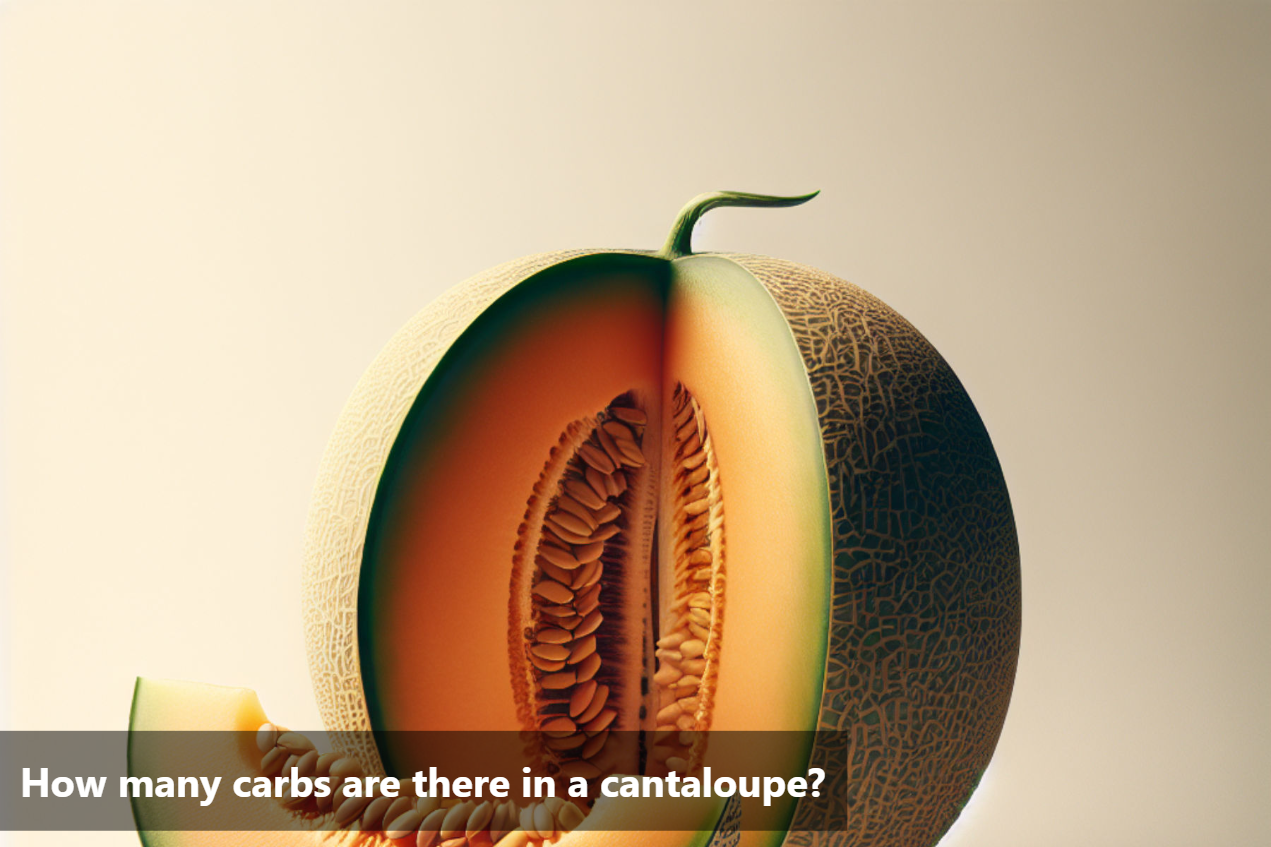
How many carbs are there in a cantaloupe?
Carbs in cantaloupe are a significant aspect to consider for those mindful of their carbohydrate intake. Understanding the carb content in fruits like cantaloupe is crucial for maintaining a balanced diet. While fruits are generally healthy, they can vary in their carb content, influencing dietary choices.
Cantaloupe contains natural sugars that contribute to its carb content. Being aware of how many carbs are present in cantaloupe can assist individuals following specific diets or monitoring their sugar intake. Balancing the consumption of fruits with lower carb content can help in managing overall carb intake effectively. This awareness is particularly essential for individuals with dietary restrictions or health conditions that require monitoring carbohydrate consumption.
Considering the carbs in cantaloupe is not about avoiding fruits altogether but making informed choices. By understanding the carb content in cantaloupe and other fruits, individuals can personalise their diets to align with their health goals. This knowledge empowers individuals to make conscious decisions regarding their fruit consumption, fostering a balanced and healthy lifestyle.

Nutritional Profile of Cantaloupe
One cup of raw cantaloupe balls (177g) provides the following:
Nutrients |
Amount per serving |
Calories |
60 |
Fat |
0.3g |
Sodium |
28g |
Carbohydrates |
14.4g |
Fibre |
1.6g |
Sugars |
14g |
Protein |
1.5g |
Vitamin C |
65mg |
Vitamin A |
299.1mcg |
Potassium |
472.6mg |
Magnesium |
21.2mg |
Folate |
37.2mcg |
Beta carotene |
3575.4mcg |
Vitamin K |
4.4mcg |
Factors Affecting Carb Content in Cantaloupe
When it comes to understanding the carb content in cantaloupe, several factors play a crucial role in determining the overall carbohydrate levels.
One significant factor to consider is the ripeness of the fruit. As cantaloupes ripen, their sugar content tends to increase, subsequently affecting the total carbohydrate content. This means that a riper cantaloupe may contain slightly higher carb levels compared to an unripe one.
Another factor that influences the carb content in cantaloupe is the serving size. The amount of cantaloupe consumed directly correlates with the intake of carbohydrates. Larger portions will naturally contain more carbs than smaller servings. Therefore, it is essential to be mindful of portion sizes to better manage carb intake from fruits like cantaloupe.
-
Furthermore, the preparation methods used can also impact the carb content in cantaloupe. For instance, adding sweeteners or pairing cantaloupe with sugary toppings can significantly increase the overall carbohydrate levels. Opting for plain, fresh cantaloupe is a healthier choice in terms of managing carb intake.
By being aware of these factors such as ripeness, serving size, and preparation methods, individuals can make informed decisions regarding their carb consumption from cantaloupe while enjoying its sweet and refreshing taste.
Cantaloupe at home: Easy to go
Recipe
Ingredients
Instructions
Cantaloupe Smoothie
Cantaloupe chunks, Greek yogurt, honey, ice cubes.
Blend cantaloupe chunks with Greek yogurt, honey, and ice cubes until smooth. Pour into a glass and enjoy a refreshing smoothie.
Cantaloupe Salsa
Diced cantaloupe, red onion, jalapeño, cilantro, lime juice, salt.
Mix diced cantaloupe, red onion, jalapeño, and cilantro. Add lime juice and salt to taste. Serve as a salsa with tortilla chips or as a topping for grilled chicken or fish.
Cantaloupe Salad with Prosciutto
Cantaloupe balls or cubes, prosciutto slices, fresh mint, balsamic glaze.
Combine cantaloupe with prosciutto slices and fresh mint. Drizzle with balsamic glaze for a sweet and savory salad.
Cantaloupe and Mozzarella Skewers
Cantaloupe cubes, fresh mozzarella balls, basil leaves, balsamic reduction.
Thread cantaloupe cubes, fresh mozzarella balls, and basil leaves onto skewers. Drizzle with balsamic reduction for a delightful appetizer.
Cantaloupe Sorbet
Cantaloupe puree, sugar, lemon juice.
Blend cantaloupe puree with sugar and lemon juice. Freeze the mixture, stirring occasionally until it reaches a sorbet consistency. Scoop and enjoy!
Cantaloupe and Cucumber Gazpacho
Cantaloupe, cucumber, bell pepper, red onion, tomato, lime juice.
Blend cantaloupe, cucumber, bell pepper, red onion, and tomato. Stir in lime juice and chill for a refreshing gazpacho.
Grilled Cantaloupe with Honey and Mint
Cantaloupe slices, honey, fresh mint.
Grill cantaloupe slices until grill marks appear. Drizzle with honey and sprinkle fresh mint for a simple and delicious dessert.
Cantaloupe and Feta Salad
Cantaloupe cubes, feta cheese, arugula, balsamic glaze.
Toss cantaloupe cubes with feta cheese and arugula. Drizzle with balsamic glaze for a light and flavorful salad.

Cantaloupe: Unveiling the Sweet Facts
Knowing the carb content in cantaloupe is essential for a balanced diet. Cantaloupe, although a sweet and refreshing fruit, contains a moderate amount of carbohydrates. By being mindful of the carb intake from fruits like cantaloupe, individuals can make informed choices for their overall health.
Considering how many carbs are in cantaloupe, it is crucial to note that a typical serving size of 177 grams of cantaloupe contains around 12 grams of carbohydrates. These carbs primarily consist of natural sugars and dietary fibre, contributing to the fruit's overall nutritional value. Incorporating cantaloupe, along with other fruits, into a well-rounded diet can provide essential vitamins, minerals, and fibre while being mindful of the carb content. It is about balance and making informed choices that support overall well-being and nutrition.
This Blog post is an initiative by Lo! Foods, to provide accurate and Nutritionist / Doctor approved information related to Health. Lo! Foods is India's leading brand for Everyday Functional Foods. Foods designed for specific Health conditions or Needs. Lo! Foods also runs India's largest range of Low Carb Healthy Cloud Kitchens, under the brand names of Lo!, ProteinChef, ATH (All Things Healthy) and DiabeSmart.













Leave a comment
Your email address will not be published.